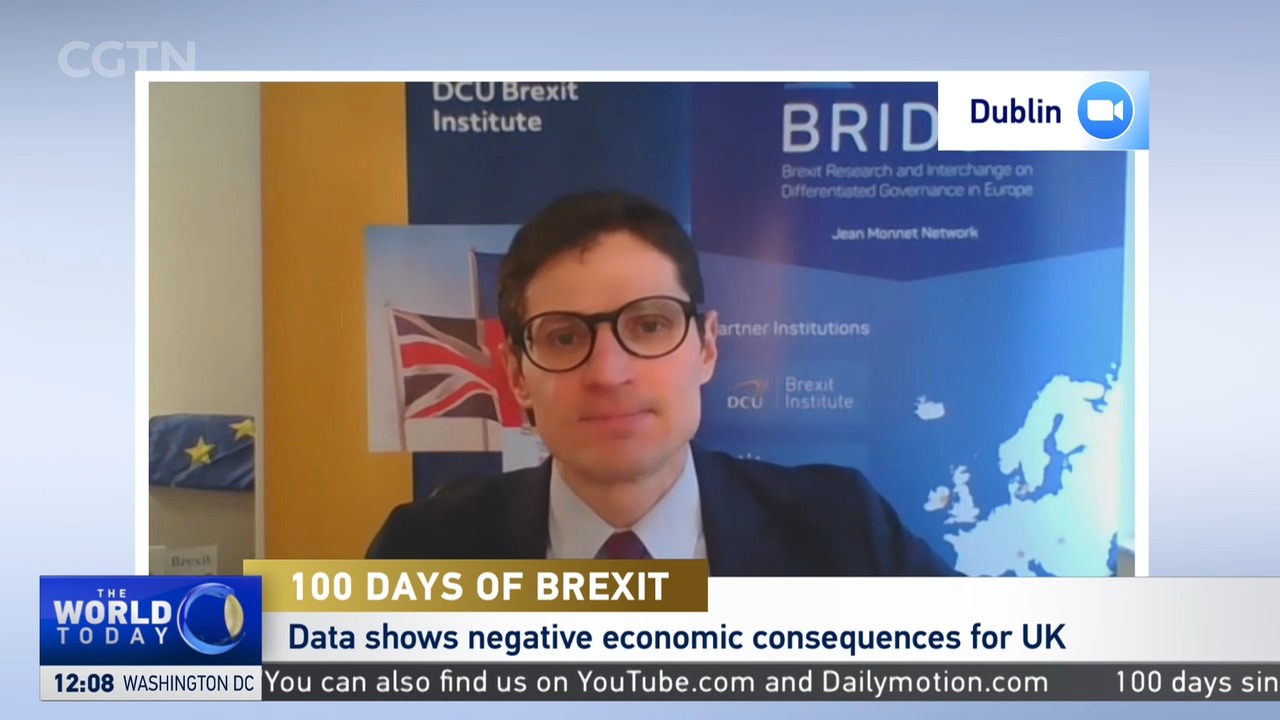04:08

The UK economy grew by 0.4 percent in February, with exports of goods to the European Union (excluding precious metals) up by almost 50 percent in a month.
Tuesday's announcement by the Office for National Statistics (ONS), followed a calamitous fall in January after the Brexit transition deal ended on December 31.
The news will come as a relief to UK Prime Minister Boris Johnson, who led the Brexit campaign, although critics say any celebrations would be premature. One leading Brexit expert told CGTN Europe that in a sense "Brexit hasn't happened yet."
The report's opening line states: "Exports of goods to the EU, excluding non-monetary gold and other precious metals, partially rebounded in February 2021, increasing by 3.7 billion pounds [$5.1bn] (46.6 percent) after a record fall of 5.7 billion pounds [$7.8bn] (negative 42 percent) in January."

Economists polled by Reuters had expected growth of 0.6 percent, although data also showed the fall in gross domestic product in January was not as severe as previously estimated.
The UK economy shrank by almost 10 percent last year, its largest slump for more than 300 years, as the country was battered by the COVID-19 pandemic.
The figures show gross domestic product remained 7.8 percent lower than in February 2020, before the pandemic swept Europe. It was also 3.1 percent lower than in October, before the two latest lockdowns hammered Britain's huge services sector.
British goods exports to the EU, excluding non-monetary gold and precious metals, were 41.4 percent down year-on-year in January but partially recovered to 12.5 percent down year-on-year in February.
Sales of machinery and transport equipment and chemicals, particularly cars and medicinal and pharmaceutical products, drove the increase. Imports were 11.5 percent down year-on-year.
Substantial challenges
The ONS quoted a Business Insights and Conditions Survey (BICS) report suggesting additional paperwork and higher transportation costs remain substantial challenges for UK importers and exporters.
"Despite the evidence of partial recovery from the substantial January falls in some commodities, it is still too soon to determine to what extent the monthly changes in trade for January and February can be directly attributed to the end of the transition period," the ONS stated.
Speaking before the figures were announced, Federico Fabbrini, founding director of DCU (Dublin City University) Brexit Institute, told CGTN Europe the introduction of customs declarations would remain an ongoing problem for UK exporters.
Fabbrini said: "Since the end of the transition period, the consequences of Brexit are becoming visible. The trade and cooperation agreement negotiated between the parties in 2020 has prevented the introduction of tariffs, but not the return of customs declarations. Moreover, the new trade relationship does not cover services, does not allow for free movement of persons and is minimal in many respects."
He added: "The governance structure of the trading cooperation agreement creates a system whereby the parties are effectively expected to continue to negotiate a technical level in multiple issues. There will be pressure for the parties to continue engagement in other frameworks. So, indeed, Brexit hasn't happened yet. The process is still ongoing."
Source(s): Reuters

